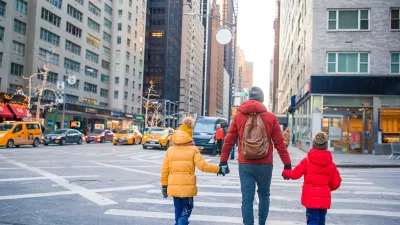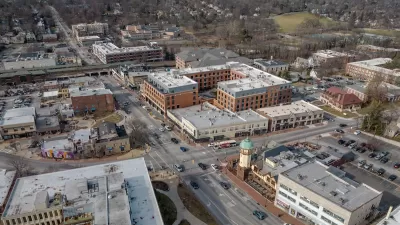When corporations move out of the suburbs, they leaving behind largely unprofitable corporate campuses. Loss of property value and tax revenue follow in the communities they left.

Past decades have seen a trend of major corporations moving their headquarters away from suburbs and small cities and toward larger cities or, in some cases, remote work environments. "Suburban business parks are as outdated and obsolete as fax machines," writes David Bernstein in an article tracking 'big empties,' the "sprawling, once-trendy corporate campuses left behind in the suburbs as companies increasingly relocate to urban centers."
Developing technologies enabled companies like Kmart, McDonald's, Motorola Solutions, and Kraft Heinz to leave their corporate campuses, says Bernstein. It's no longer necessary for all employees to work from a central office. The emptiness of once-booming business centers has consequences for the communities in which they stand. Bernstein traces examples of unoccupied corporate campuses that, without tenants, lose property value and tax revenue leaving local government to pick up the slack.
The vacant campuses now face one of two futures: continued vacancy or demolition. In the case of an AT&T campus that has lost more than $6 million in value over the past five years, plans are being developed to build a 'metroburb,' complete with retail, restaurants, office space, and housing in its place.
FULL STORY: The Big Empty: How Corporate Headquarters Have Abandoned America’s Suburbs

Planetizen Federal Action Tracker
A weekly monitor of how Trump’s orders and actions are impacting planners and planning in America.

Congressman Proposes Bill to Rename DC Metro “Trump Train”
The Make Autorail Great Again Act would withhold federal funding to the system until the Washington Metropolitan Area Transit Authority (WMATA), rebrands as the Washington Metropolitan Authority for Greater Access (WMAGA).

The Simple Legislative Tool Transforming Vacant Downtowns
In California, Michigan and Georgia, an easy win is bringing dollars — and delight — back to city centers.

The States Losing Rural Delivery Rooms at an Alarming Pace
In some states, as few as 9% of rural hospitals still deliver babies. As a result, rising pre-term births, no adequate pre-term care and "harrowing" close calls are a growing reality.

The Small South Asian Republic Going all in on EVs
Thanks to one simple policy change less than five years ago, 65% of new cars in this Himalayan country are now electric.

DC Backpedals on Bike Lane Protection, Swaps Barriers for Paint
Citing aesthetic concerns, the city is removing the concrete barriers and flexposts that once separated Arizona Avenue cyclists from motor vehicles.
Urban Design for Planners 1: Software Tools
This six-course series explores essential urban design concepts using open source software and equips planners with the tools they need to participate fully in the urban design process.
Planning for Universal Design
Learn the tools for implementing Universal Design in planning regulations.
Smith Gee Studio
City of Charlotte
City of Camden Redevelopment Agency
City of Astoria
Transportation Research & Education Center (TREC) at Portland State University
US High Speed Rail Association
City of Camden Redevelopment Agency
Municipality of Princeton (NJ)





























